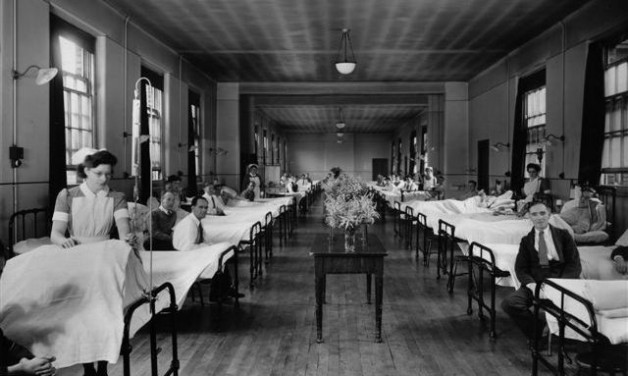Like 99.9% of the world’s population, I don’t enjoy getting sick. The constant runny nose, soreness of the entire body, continuous coughing, and that neat “head stuck in a fishbowl” feeling are just some of the lovely effects of even the most common of common colds. I don’t even like thinking about being sick, but with the cold season upon us, I find myself doing just that—then popping another zinc tablet.
When I’m feeling ill—as if this might ward off future colds—I usually make a resolution. Maybe you do the same. Mine goes something like this: “Lord, once I get well I will always remember to thank you for not being sick.” Of course, like too many resolutions, I never seem to keep it once I’m in the clear. It usually takes another cold to jog my memory.
This got me thinking: was this even a reasonable resolution to make? Was it just an empty pious practice? What would St. Thomas make of all this? Here’s what I came up with:
Behind the notion of thanking God for health seems to lurk the idea that health and sickness are two opposed but equally likely states for the human body. Sickness is something that happens to the body, so in the same way I naturally think of health as something that happens to the body. On this account, health mainly differs from sickness in a quantitative sense: I am healthier more often than I am sick.
Here’s the problem: The body is made out to be something neutral awaiting further determination. “Will I be sick or healthy today? Right now I am neither.” But of course this is simply not the case, at least according to St. Thomas.
For St. Thomas, nothing in the order of creation is “neutral” in the sense of waiting to be determined as good or bad, well or ill. If it exists, it is good:
Every being, as being, is good. For all being, as being, has actuality and is in some way perfect; since every act implies some sort of perfection . . . Hence it follows that every being as such is good. (ST I, 5, 3)
St. Thomas’s God is radically different from any created thing. He is ipsum esse per se subsistens—being itself as pure act. All that exists participates in his being in a mixed and partial way. But even the lowest grade of matter has being: it exists, and so shares in God’s goodness. Later in the Summa, St. Thomas uses this crucial insight to discuss evil in relation to good:
It cannot be that evil signifies being, or any form or nature. Therefore it must be that by the name of evil is signified the absence of good. And this is what is meant by saying that evil is neither a being nor a good. For since being as such is good, the absence of one implies the absence of the other. (ST I, 48, 1)
Any nature (whether rock or human) is good and therefore cannot be understood as something neutral awaiting some future determination. The verdict is in: all existing things are good! Evil is not a thing or a being, but the absence of a good. Being ill is an evil, which presumes that we have the goodness of being to begin with. One must have something to have an absence in that thing.
If St. Thomas is correct, then health is the normal functioning of a human nature and sickness is the absence of some part of normal functioning. It seems then that Thomas would not approve of my resolution to give thanks for the natural state of being healthy. But does the naturalness of good health mean I have no need of giving thanks? Is my health something owed to me? Should I be mad at God for removing it from me when I catch a cold?
By no means! Just when I think I’m off the hook, St. Thomas reminds me that I’ve forgotten to give thanks for my existing at all. My healthy human nature is not owed to me; like all created things it is an utter gift of the most gracious God. I don’t need to thank God for making me healthy, as if health were a “thing” happening to me, but I do need to thank him for making me a being who can be and is healthy most of the time.
In fact, St. Thomas has made me aware of the necessity of an even greater gratitude. Not only should I thank him for my creation, but I should even praise Him even when I am ill. Even though sickness is a privation, there is still being underlying that privation, and being is itself good!
So it turns out that when I ask St. Thomas if I need to be thankful for one thing, he teaches me that I need to be thankful for many things. Fine, no more resolutions from now on—just gratitude for the gifts God gives me. And plenty of vitamin C, just in case . . .
✠
Image: Old Walton Wards







